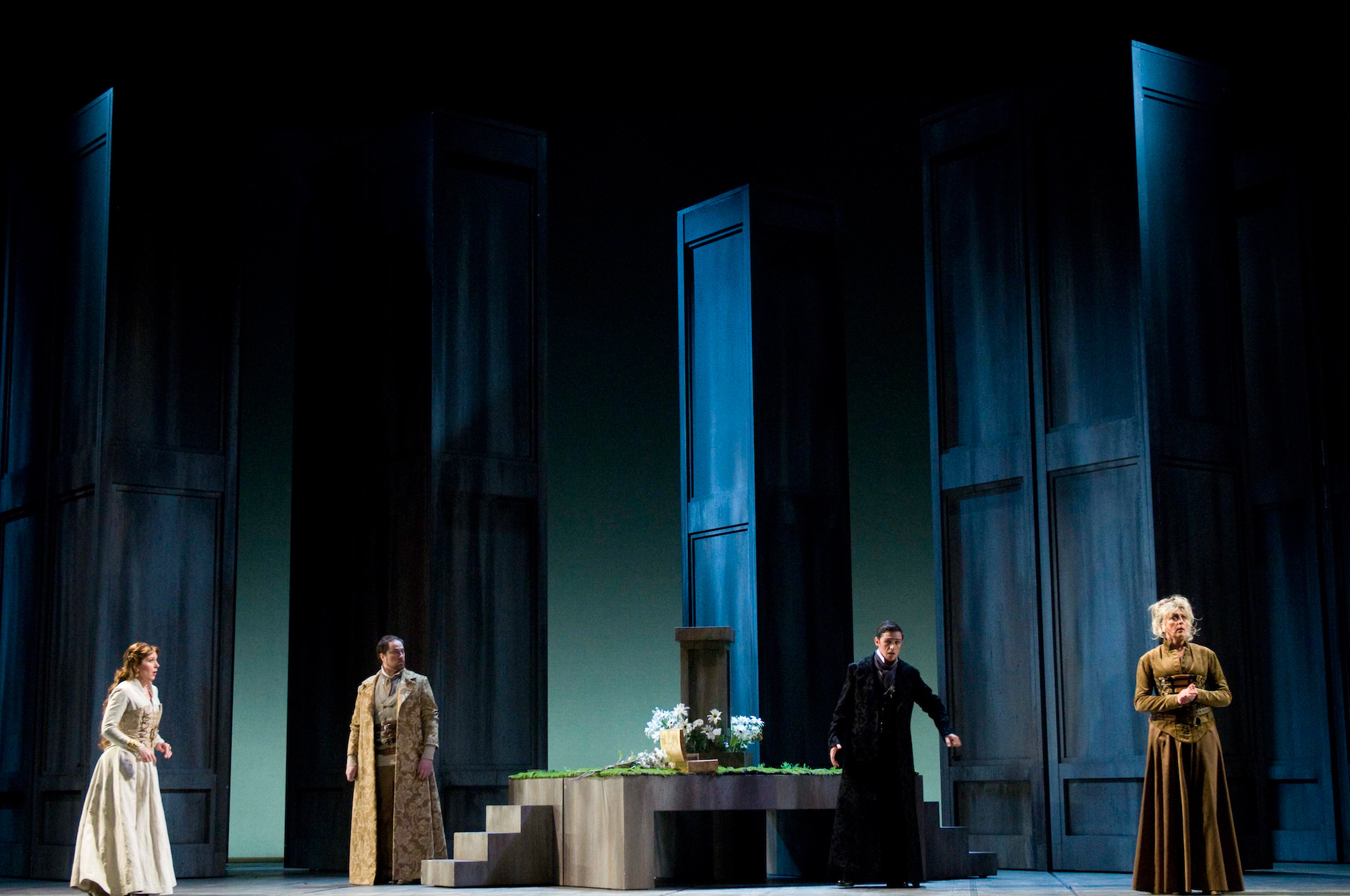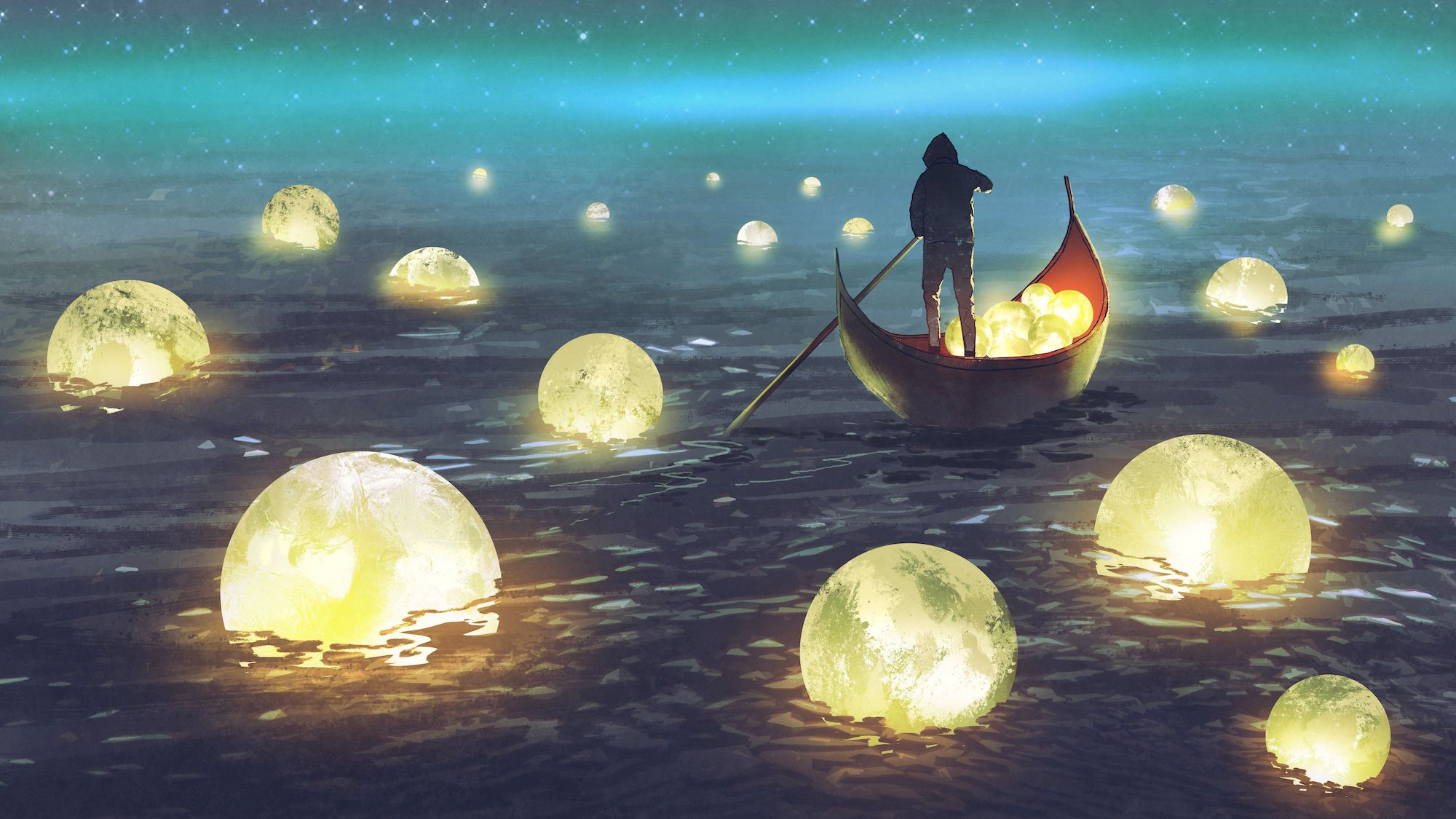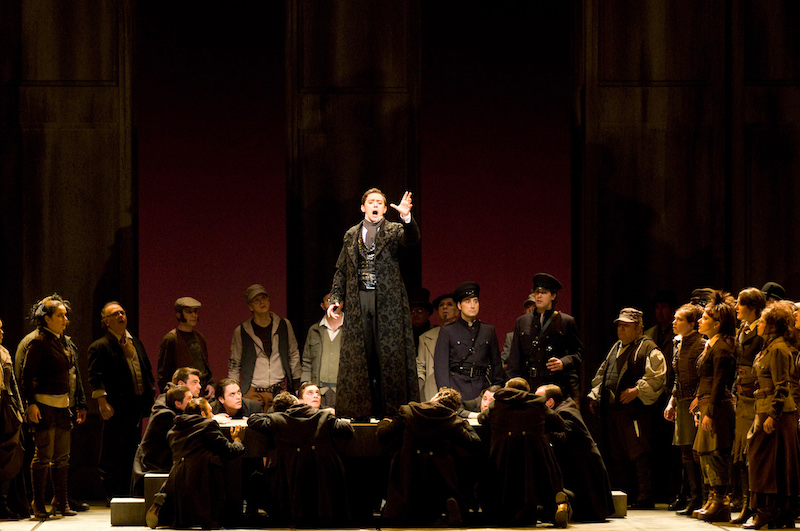Opera is big.
The stories are larger than life, the voices huge, the sets massive and the themes explored — Love, Death, Sin, Murder, Redemption — all require capitalization.
Nowhere is opera bigger than in Charles Gounod’s Faust, which kicks off the third annual Vancouver Opera Festival this Saturday.
The festival itself is also extremely large.
In addition to Faust, there are two other major productions — Rossini’s La Cenerentola (Cinderella), and Brian Current’s oratorio-style opera The River of Light. Plus, there are film screenings, symposia, talks, art walks, parties, backstage tours, circus performances and a singing competition titled VOX.
On a recent grey Vancouver day, I got a sneak peek at the festival productions, starting with Cenerentola in the morning and Faust in the afternoon. When I arrived at the Russian Hall in Vancouver’s Strathcona neighbourhood, not a lot was happening, musically speaking.
Under the direction of Rachel Peake, the cast was figuring out a bit of stage business, requiring one of the singers to roll off the end of a table, his legs in the air, like an upended donkey.
The pianist scrolled her phone, and maestro Leslie Dala flipped through the score. I sat in the corner and tried to blend into the wall, feeling spy-like.
For such a large-scale art form I found the rehearsals surprisingly intimate, delicate even, as the singers blocked out the movements and figured out how to deal with props like a pair of shoes and a pouffy dress, or, in the case of Faust, how to carry a fake baby and a sizeable dagger at the same time.
The oddness of watching the singers channel iconic characters and stories, dressed in leggings and jeans, was funny enough, but like any rehearsal there was also a certain amount of goofing around.
Dala explained that it was a quiet day for Cenerentola, as some of the cast members weren’t there. Peake took a moment to tell a story about a patron who took a tiny hit of acid whenever he went to the opera.
Then it was back to rehearsing. The finer details of the table-rolling bit required some time, but once all parties were satisfied, there was a break. After the singers wandered back in, out came the music, and every nerve ending leapt to attention.
Opera does that. Performers open their mouths, and the ordinary world falls away.
Watching the singers work out the best way to telegraph action and emotion to the back row was a lesson in stagecraft. Like many of Rossini’s operas, there’s a lot of comedic stuff layered on top of incredibly demanding and complex musical structures. It’s a lot to juggle.
The last time I saw a Rossini production was at the Metropolitan Opera in New York. The performers were so far away that binoculars would have come in handy, but the sound bounced off the walls and the Met’s famous chandeliers, exploding like a shower of heated sparks.
It was a new experience to see opera this close up and personal, and it provided an entirely different perspective.
The Vancouver Opera’s rehearsal hall, just off Third Avenue in East Vancouver, might be a world away from the Met, but the principles of combining theatre and music are the same. That afternoon, the cast of Faust was hard at work channelling the epic insanity that is opera’s final scene.
If Cenerentola is all lightness and frolic, Faust is the darker side of the form. Last seen in the Vancouver Opera’s 2005-06 season, this version takes the familiar story and injects new life in the form of an all-Canadian cast.
It’s got all the thrills and trills — some sexy stuff, the devil and the Jewel Song, made most famous by everyone’s favourite diva, Bianca Castafiore.
The plot, in short, concerns a rancid old philosopher who makes a deal with the devil for youth and some romantic action with a beautiful young woman named Marguerite. The devil keeps his end of the bargain, along with a few things that weren’t in the contract.
In addition to the salacious premise, there are also enormous choruses, a ballet, and even a witchy orgy set during Walpurgis Night.

After the cast ran through the final scene in rehearsal, I was tempted towards wild applause and tears, but no one else seemed all that excited.
Soprano Simone Osborne chatted with the stage director, while tenor David Pomeroy wandered out the door.
Robert Pomakov, who plays Méphistophélès, twiddled a walking stick, while the rest of the staff busied themselves with the practical stuff of making art.
Only maestro Jonathan Darlington, sporting a head of hair that would make Leonard Bernstein proud, radiated an air of palpable joy.
Osborne, who grew up in Vancouver and paid for her studies by working at Dairy Queen, is new to the role of Marguerite, whereas Pomeroy has played the title role multiple times. Pomakov is an operatic veteran, but his performance in Faust marks his Vancouver opera debut.
Sitting and watching the pieces come together I was reminded of how deeply weird opera is, but also how glorious, strange and wonderful. A nutty ornate rococo thing, beamed in from a bigger more fantastical world, filled with giants, rainbow bridges, the devil and celestial choirs that descend from on high.
Unlike other opera festivals around the world, such as Glyndebourne in the U.K., and the granddaddy of them all, Bayreuth in Germany, designed and built for the purpose of staging Wagner’s Ring Cycle, the Vancouver Opera Festival has a more modest mandate. Namely to make opera open and accessible to Vancouver audiences.
“This is the festival’s third year,” said Colleen Maybin, the opera’s director of education and community engagement, reflecting on the festival’s progress so far. “There’s a better sense of connection with the community, and we’ve doubled down on the things that are going well by curating more consciously.”

She offers up Brian Current’s The River of Light as an example of a truly Canadian collaboration. Current, the recipient of awards aplenty, took inspiration from Dante’s Paradiso to create an Oratorio-style opera.
In addition to the soloists (Caitlin Wood and Martin Renner Wallace), the production also includes the Vancouver Bach Choir and the Vancouver Opera Orchestra, performing the words of nine different poets from inclusive and diverse perspectives, such as Hindu, Christian, Hebrew, Indigenous Canadian, Islamic, secular and Chinese.
When I asked about her hopes for the festival, Maybin was candid about the nature of the art form, as well as the place it occupies in the broader cultural terrain. “There is a tradition of opera in Vancouver, it’s not stagnant. It’s not a museum. Join us, we don’t know where we’re going!” she laughed.
Part of the pleasure of a festival is a sense of exploration and discovery. But the opera has thought clearly about what it means to make the form accessible, ensuring that there’s something for almost everyone, from the cognoscenti to the neophytes.
In addition to more formally staged events, a variety of community offerings kick off with Party on the Plaza on Sunday, April 28.
The full day of programming includes performances, backstage tours, an art walk, roaming singers, circus acts and the Langley Ukulele Ensemble. Because no operatic event is complete without a little ukulele action.
Opera will then pop up all over the city, with a screening of the 1926 film version of Faust accompanied by live improvisation from pianist Chris Gestrin at the Fox Theatre, followed by a performance from soprano Rachel Fenlon, who accompanies herself on piano.
Fenlon’s bravura turn features an eclectic mix of Joni Mitchell, John Cage, Ravel, Mahler and Mozart, as well her own work inspired by the lesbian poet Sappho.
“It’s a cool experience that might lead people to come down for more than just the mainstage productions,” said Maybin.
Something that sets the Vancouver Opera Festival apart from other events is a dedication to diversity and inclusion. This commitment takes several forms, including work inspired by First Nations art practice.
Maybin explained that Indigenous culture and opera actually work quite well together, as both employ grand storytelling in loud voices. “The longhouse voice is akin to operatic voice,” she said.
The Flight of the Hummingbird, a co-production with Pacific Opera Victoria and the Vancouver Opera’s Opera in Schools program, features music by Maxime Goulet and a libretto by Haida artist Michael Nicoll Yahgulanaas and Barry Gilson.
The work inspired a professional development workshop on decolonizing music titled Music, Ceremony and Protocol: Indigenizing Music Education that aims to help elementary and secondary school teachers bring Indigenous repertoire into classrooms.
The Vancouver Opera has also tackled inclusion in other ways, addressing barriers that most people don’t even think about. The festival is offering Canada’s first relaxed operatic performance on Wednesday, May 2.
The intent is to make this most intensive art form accessible to folk who couldn’t normally attend a three-hour sit-down performance (people on the autism spectrum, for example, or very young children).
In a relaxed performance, the lights stay on, the doors stay open, and sound cues are removed. Audience members can also use earplugs or sound-dampening headphones, and screens (cell phones and computers) are allowed. The entire cast, including the orchestra, introduce themselves to the audience before the performance begins.
It’s an interesting idea, but the thing that I love the most about opera is the sense of being completely overwhelmed, obliterated by a sea of sound, drowning in its excess.
Leaving the rehearsal hall, I felt almost giddy. Walking out into the spring sunshine, the beauty of the world walloped me in the face, and I was reminded that music is paradise. Just listen to the final chorus in Faust and tell me I’m wrong.
The third annual Vancouver Opera Festival runs April 27 to May 5 in venues across the city. ![]()
Read more: Music

















Tyee Commenting Guidelines
Comments that violate guidelines risk being deleted, and violations may result in a temporary or permanent user ban. Maintain the spirit of good conversation to stay in the discussion.
*Please note The Tyee is not a forum for spreading misinformation about COVID-19, denying its existence or minimizing its risk to public health.
Do:
Do not: